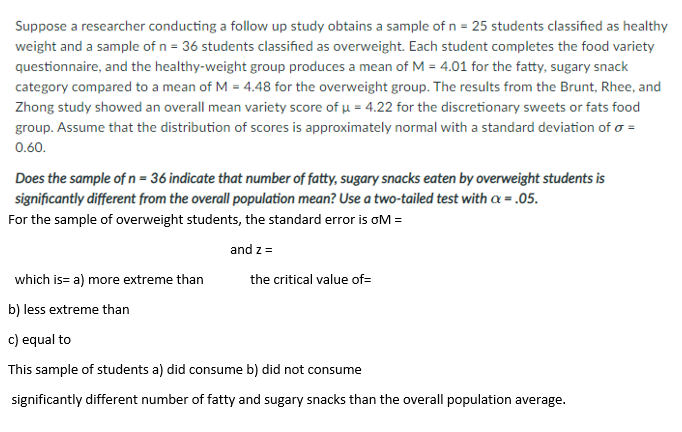Suppose a researcher conducting a follow up study obtains a sample of n = 25 students classified as healthy weight and a sample of n = 36 students classified as overweight. Each student completes the food variety questionnaire, and the healthy-weight group produces a mean of M = 4.01 for the fatty, sugary snack category compared to a mean of M = 4.48 for the overweight group. The results from the Brunt, Rhee, and Zhong study showed an overall mean variety score of u = 4.22 for the discretionary sweets or fats food group. Assume that the distribution of scores is approximately normal with a standard deviation of o = D.60. Does the sample of n = 36 indicate that number of fatty, sugary snacks eaten by overweight students is significantly different from the overall population mean? Use a two-tailed test with a = .05. or the sample of overweight students, the standard error is oM = and z = which is= a) more extreme than the critical value of= less extreme than
Suppose a researcher conducting a follow up study obtains a sample of n = 25 students classified as healthy weight and a sample of n = 36 students classified as overweight. Each student completes the food variety questionnaire, and the healthy-weight group produces a mean of M = 4.01 for the fatty, sugary snack category compared to a mean of M = 4.48 for the overweight group. The results from the Brunt, Rhee, and Zhong study showed an overall mean variety score of u = 4.22 for the discretionary sweets or fats food group. Assume that the distribution of scores is approximately normal with a standard deviation of o = D.60. Does the sample of n = 36 indicate that number of fatty, sugary snacks eaten by overweight students is significantly different from the overall population mean? Use a two-tailed test with a = .05. or the sample of overweight students, the standard error is oM = and z = which is= a) more extreme than the critical value of= less extreme than
Glencoe Algebra 1, Student Edition, 9780079039897, 0079039898, 2018
18th Edition
ISBN:9780079039897
Author:Carter
Publisher:Carter
Chapter10: Statistics
Section10.4: Distributions Of Data
Problem 19PFA
Related questions
Topic Video
Question

Transcribed Image Text:Suppose a researcher conducting a follow up study obtains a sample of n = 25 students classified as healthy
weight and a sample of n = 36 students classified as overweight. Each student completes the food variety
questionnaire, and the healthy-weight group produces a mean of M = 4.01 for the fatty, sugary snack
category compared to a mean of M = 4.48 for the overweight group. The results from the Brunt, Rhee, and
Zhong study showed an overall mean variety score of u = 4.22 for the discretionary sweets or fats food
group. Assume that the distribution of scores is approximately normal with a standard deviation of o =
0.60.
Does the sample of n = 36 indicate that number of fatty, sugary snacks eaten by overweight students is
significantly different from the overall population mean? Use a two-tailed test with a = .05.
For the sample of overweight students, the standard error is oM =
and z =
which is= a) more extreme than
the critical value of=
b) less extreme than
c) equal to
This sample of students a) did consume b) did not consume
significantly different number of fatty and sugary snacks than the overall population average.
Expert Solution
This question has been solved!
Explore an expertly crafted, step-by-step solution for a thorough understanding of key concepts.
This is a popular solution!
Trending now
This is a popular solution!
Step by step
Solved in 2 steps

Knowledge Booster
Learn more about
Need a deep-dive on the concept behind this application? Look no further. Learn more about this topic, statistics and related others by exploring similar questions and additional content below.Recommended textbooks for you

Glencoe Algebra 1, Student Edition, 9780079039897…
Algebra
ISBN:
9780079039897
Author:
Carter
Publisher:
McGraw Hill

Glencoe Algebra 1, Student Edition, 9780079039897…
Algebra
ISBN:
9780079039897
Author:
Carter
Publisher:
McGraw Hill